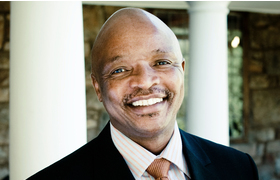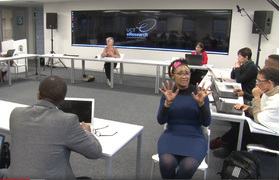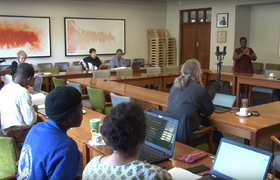Questions, but no answers, about decolonizing South African university curricula
19 October 2018 | Opinion Emeritus Professor Tim Crowe. Read time >10 min.The views and opinions expressed here are solely those of the individual authors in their private capacity; they do not represent or reflect the views, opinions or policies of the University of Cape Town or the Communication and Marketing Department.
In a public intellectual piece, political-anthropologist Shannon Morreira and sociologist Kathy Luckett pose Questions academics can ask to decolonise their classrooms.
This is good news since, so far during the Fallist Epoch, much of we’ve heard is evidence-free criticism of “institutionally racist” universities.
I guess the first question that needs to be asked is: What is decolonization? The authors neither ask nor answer this question. If decolonization is elimination of lies (e.g. validity of human races) created/perpetrated in the oppressive past, only liars would object. If, however, it means selective culling of ideas based on the ‘race’, geographical provenance, age, religion, ideology and gender of their promoters, decolonization is bigotry and censorship. If it means replacing old lies with ‘new‘ ones that cannot withstand objective scrutiny, it closes critical thinking and beckons to the ‘thought police’. Finally, if it means opening up education to diverse views that are subjected to and survive scrutiny (e.g. those epitomized in the 20th Century Evolutionary Synthesis) we’ve hit the jackpot.
Then there is Curriculum. Yes, it’s more than just the “stuff”/content that students must learn to be knowledgeable/skilled in a particular discipline to meet the needs of society. But, that doesn’t justify excluding this stuff. Yes, some sociologists argue that “curriculum” is a “highly ideological hybrid discourse”. But, much of this “discourse” involves deluging impressionable students with ‘ideas’ simply presented as plural-alternatives or ‘quick-fixes’ that reflect “ways of knowing”, “ways of doing” and “ways of being”. In the absence of evidence-based argument of their epistemological competitiveness, the result is mediocre students equipped with smorgasbord of belief-based ‘education’.
Yes, at South African universities (e.g. the University of Cape Town, my academic home for 4+ decades) some curriculum issues came to the fore during the 2015-17 protests. Sadly, these “protests” also involved verbal abuse, defamation, intimidation, violence and curriculum-independent destruction that had nothing to do with education. Yes, students “argued that what’s being taught in university courses is imported from the global North and doesn’t draw enough on African-based research and the work of academics from the global South”. But, arguing that something is happening is not the same as demonstrating its reality. At UCT, the only well-documented attempt at decolonization was the DVC for Transformation and Curriculum Change Working Group‘s (CCWG) bringing Maths-Decolonist C.K Raju to interact with the UCT Community. The colossal failure of this strategic decision is documented in detail (see here, here, here, here). In its final report, the CCWG mentions Raju only in passing and the DVC only once, misspelling her surname.
Yes, the UCT Executive has righty increased the cultural/linguistic diversity of her student population. But, rather than creating more academic posts within is core academic departments to mentor these often ‘educationally-disabled’ kids, it created a new, massive, expensive and separate faculty-like structure, the Centre for Higher Education Development (CHED) to get the academic-support job done. Sadly, the academic-support educational strategy has devolved into a failed social engineering exercise and students who need help the most have become acceptable ‘collateral damage’.
Research on decolonizing curricula conducted at UCT by the authors is based only on a case study of two first year sociology courses relates to students’ “subjective experiences”. It suggests that “many are thinking about decolonising the curriculum from only one angle: changing the content of what they teach”. First, had the authors look more broadly within UCT or read the UCT NEWS, they would have encountered examples of Afrocentric, inclusive, socially relevant academic ‘evolution’. Nevertheless, they push for novel ways of passing on “powerful knowledge” via “reflexive and contextualised teaching”. The underlying theme of “powerful knowledge” is not its truth-seeking nature but its past and present “relational” and “contextual” value. I, and many among the “Silenced Majority” at UCT during the Price Era and potential employers, do not share the authors’ views. Accordingly, we also feel “alienated and marginalised”. Of late, the ‘power’ at UCT has been in the hands of intimidators carrying bricks and fire bombs, not books. Finally, the authors point out no examples of academics and courses that fail to engage with relevant literature.
The authors heap decolonization praise on Universities in other parts of Africa. Their favourites are Makerere University (ranked +-500 internationally) and the University of Dar es Salaam (ranked 2281). They offer no evidence how this achievement makes decolonized graduates more ‘woke’, critically thinking, employable and competitive than those from ‘colonized’ UCT.
The authors belong to yet another working group involved with decolonizing UCT. They differ from the CCWG in that they have produced “a number of questions which could serve as points of departure for beginning to think about decolonising ways of teaching”.
Here they are, embellished by my comments based on 45 years of academic ‘lived experience’ at UCT. I know of no colleagues at UCT who think profoundly differently. Whatever differences that exist between me and them relate to career success of graduates.
What principles, norms, values and worldviews inform your selection of knowledge for your curriculum? (think about absences as well as presences, centres as well as margins)
My fundamental principle is ‘T.B.-Davien’ academic freedom that allows educationalists to seek the truth and not what it is demanded by others for the purposes of sectional, political, religious or ideological dogmas or beliefs. Norms/values/and world views are those supported by leading researchers (even those with whom I disagree) and employers as best-practice excellence. Within South Africa, academic excellence is assessed by the National Science Foundation Rating System. UCT is firing on all cylinders on this score. It has the largest numbers of A-rated mature researchers and P-rated developing ones.
Do you articulate your own social and intellectual position, from which you speak when lecturing?
No, I don’t. My goal is to help my students (colleagues in training) and young colleagues make the most of their desired careers. That’s why my post-graduate students (N = 59: 14 women, 12 ‘blacks’ – 13 lecturers/senior-lecturers, three institutional directors, five professors) have achieved the ultimate professional ‘degree’, the J.O.B.
For whom do you design your curriculum? Who is your ideal, imagined student and what assumptions do you make about their backgrounds, culture, languages and schooling?
The curricula in evolutionary and conservation biology that I developed expose students to strengths and weaknesses of a range of credible paradigms. Those relating to evolution are universal in application. Those concerning conservation vary, even within South Africa and from time to time. Culture and language are special skills, especially relating to conservation. Students ‘disabled’ by their pre-university education are mentored and encouraged to join study groups comprising kids with complementary backgrounds.
Does your curriculum reflect its location in Africa and the global South? To what extent does it draw on subjugated histories, voices, cultures and languages?
I worked at the top centre for African avian biology (FitzPatrick Institute of African Ornithology - ranked third overall internationally) and one of a handful of DST/NRF National Centres of Excellence. Histories, voices and cultures form integral parts of what I teach and how I teach. ‘Subjugation’ is based on empirical failure despite mentoring. I teach in English, the lingua franca of modern science.
How does your teaching recognise and affirm the agency of black and first-generation students? How does your teaching legitimate and respect their experiences and cultures?
I was the first in my family to attend university and one of the two (out of 32 grandchildren) to earn a Ph.D. Accordingly, I treat students as individuals and tailor their education to their aspirations, not their histories or lived experiences.
Can you speak indigenous or regional languages and relate to the cultures and lived experiences of all students? Do you draw on these valuable resources in your teaching?
No and yes. For an example of ‘yes’ I ask my students to compare how their peoples partition biodiversity at the species level. For information, peoples from Africa tend to lump species into more inclusive entities and those from Asia split them along lines more congruent to scientifically-determined entities.
How does your curriculum level the playing fields by requiring traditional/ white students to acquire the intellectual and cultural resources to function effectively in a plural society?
Not at all. The sciences I identify with/work-within are inherently competitive, philosophically diverse and often driven by antagonistic egocentric personalities. My conservation-focused graduates have to deal with real-world problems they experience during their research.
How do you build a learning community in your classroom where students learn actively from each other and draw on their own knowledge sources?
This is done by requiring students who don’t work within sensible clusters to present their research results to one another and at international conferences. Home-acquired knowledge fits in when it complements or decisively conflicts with null hypotheses. Critical thinking that charts new directions gets and A+.
How do your assumptions about curriculum knowledge play out in the criteria that you use to assess students? What can you do to make your assessment practices more fair and valid for all students, without inducing high levels of anxiety? What assessment methods could show what all students are capable of, drawing on their strengths and promoting their agency and creativity?
My thinking has evolved over time to accommodate superior conflicting approaches and unexpected empirical results. I learn from my students, but do not defer to them when they offer poorly-evidenced, logically inferior arguments. I believe what I see, not see what I believe. Validity emerges from personal endeavour not from the boss. Steel must pass through the fire, but no one is left behind unless they warrant it because of self-generated failure despite capability and mentoring. The fact that some of my students have eclipsed me professionally attests to this. Several of my ‘failed’ students (who withdrew) have even found professional success.
How far do your teaching and assessment methods allow students to feel included without assuming assimilation?
None of my students is a ‘Mini-Me’. Many just quietly ignore me these days. More often than not, I seek their advice.
Replacing nuanced racism with “hidden practices”
I can see how all first-year university students experience ‘culture shock’. I was the top graduate from my high school and brother of a previous top student. Yet, during my first year at a then second-tier university (University Massachusetts) I earned average marks. But, with the help of my student advisor, advice from my ‘smarter’ brother and, most important, hard work, I graduated magna cum laude and at the top within my department. If anything, my first year as an M.Sc. student at the University of Chicago (ranked 10), was more traumatic. Once again, I sought advice from supervisors, associated with brighter fellow students and worked my tail off. In the end, I published two papers from my M.Sc. research.
But, when I arrived at UCT in the early 1970s, I was shocked the most. There was the spectre of Apartheid. Although there were only a handful of nie-blanke students during my first decade, I saw no evidence of even nuanced racism. My problems were more cultural. I am an Irish-American and my grandfather experienced severe oppression from English occupiers in Ireland as a young man. He remembered being defamed as a “half-black bogtrotter” by some Englishmen. If anything, he experienced more aggressive discrimination in Boston as a young immigrant from the more-English-than-English Boston Brahmans. Many had supported the Know-Nothing or American Party that was strongly anti-immigrant and especially anti-Roman Catholic. To his death he still recounted advertisements that said: “No dogs, ni**ers, or Irishmen” and he took great pride when he bought the home of a brahmin bankrupted during the Great Depression.
UCT’s academics were almost exclusively white males and several in the Biosciences were members of the university cricket team, once captained by VC Sir Richard Luyt. [I still find it difficult to watch a match played over five days and nobody wins.] When I tried to introduce myself to the HoD, a one-legged-WWII, Englishman war veteran, he simply ignored me. Most disturbing however was the fact that many Bioscience academics were ultra-Darwinian selectionists who dismissed taxonomic research as worthless. Indeed, my Ph.D. supervisor initially forbade me from including it in my dissertation. After it was published and well-reviewed, he uncharacteristically sent me a letter of apology for his authoritarian behaviour.
However, since the mid-1970s the academic ‘barons’ lost power and were replaced by more caring, academically flexible academics much more willing to invest themselves in students. Thus, in-your-face
Emeritus Professor Tim Crowe
 This work is licensed under a Creative Commons Attribution-NoDerivatives 4.0 International License.
This work is licensed under a Creative Commons Attribution-NoDerivatives 4.0 International License.
Please view the republishing articles page for more information.









